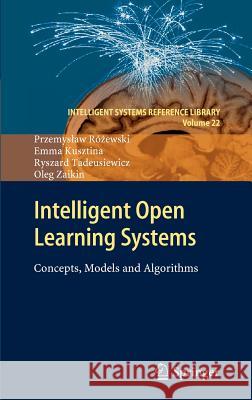Intelligent Open Learning Systems: Concepts, Models and Algorithms » książka
Intelligent Open Learning Systems: Concepts, Models and Algorithms
ISBN-13: 9783642226663 / Angielski / Twarda / 2011 / 257 str.
Intelligent Open Learning Systems: Concepts, Models and Algorithms
ISBN-13: 9783642226663 / Angielski / Twarda / 2011 / 257 str.
(netto: 383,36 VAT: 5%)
Najniższa cena z 30 dni: 385,52
ok. 22 dni roboczych.
Darmowa dostawa!
In presented book the Intelligent Open Learning Systems (IOLS) are proposed, described, discussed, and evaluated. The IOLS is a system in which traditional methods of online teaching are enhanced through the use of artificial intelligence and cognitive science. This is the main topic of the book.
It consists of ten chapters and is divided into three parts. The first part concentrates on the Open Learning System (OLS) analysis, in particular: the social and educational meanings of the OLS, the new role of the teacher and the new requirements regarding the structure of didactic material. Moreover, the cybernetic model of student, teacher and computer collaboration is presented, the teaching-learning process content and its main characteristics are discussed, and the system based approach to the OLS design is proposed. The second part is focused on the problem of knowledge modeling in the OLS based on the ontology and the competence approaches and leading to the learning object concept and competence management in open systems. The third part describes applications of the OLS in the virtual laboratory for competence transfer, the community-built system of distance learning network, and the AGH student city - the real-life application of the OLS concept.
The authors' research findings presented in the book should be useful in various applications related to knowledge management, e-learning systems and information systems.
In presented book the Intelligent Open Learning Systems (IOLS) are proposed, described, discussed, and evaluated. The IOLS is a system in which traditional methods of online teaching are enhanced through the use of artificial intelligence and cognitive science. This is the main topic of the book. §It consists of ten chapters and is divided into three parts. The first part concentrates on the Open Learning System (OLS) analysis, in particular: the social and educational meanings of the OLS, the new role of the teacher and the new requirements regarding the structure of didactic material. Moreover, the cybernetic model of student, teacher and computer collaboration is presented, the teaching-learning process content and its main characteristics are discussed, and the system based approach to the OLS design is proposed. The second part is focused on the problem of knowledge modeling in the OLS based on the ontology and the competence approaches and leading to the learning object concept and competence management in open systems. The third part describes applications of the OLS in the virtual laboratory for competence transfer, the community-built system of distance learning network, and the AGH student city the real-life application of the OLS concept. §The authors research findings presented in the book should be useful in various applications related to knowledge management, e-learning systems and information systems.











